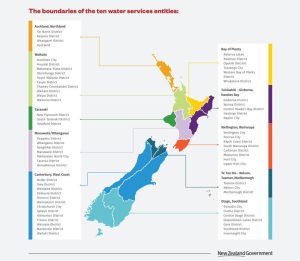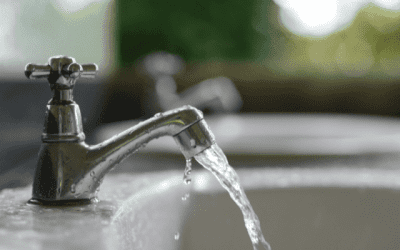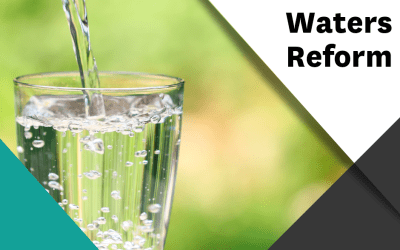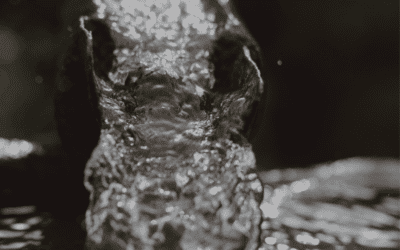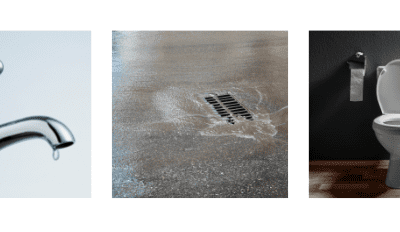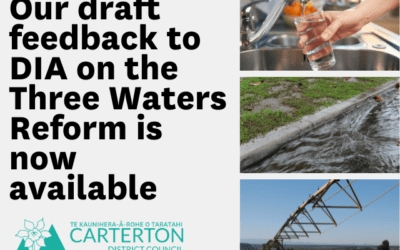Water Reforms
Last updated: 17 Jul, 2024 09:18pm
What is Three Waters?
About the reforms
Questions And Answers
News & Updates

What is Three Waters?
Three Waters refers to drinking water, wastewater, and stormwater services.
Drinking water
The water your family drinks from the tap has to be safe. Most New Zealanders get their water from Council supplies. This water comes from rivers and aquifers, and through treatment plants. The plants are designed to meet water standards, so homes and businesses enjoy safe water.
Wastewater
Millions of litres go to Wairarapa households every day. Because about 1% of that is human and other waste, it contains many bacteria and viruses that could be harmful to human health. This is then treated at a wastewater treatment plant, and sent to irrigate land, or discharged to sea.
Stormwater
The stormwater system is a network that drains the rain off of our roads, footpaths, and from our gutters, and diverts it into our streams, rivers and eventually out to sea. Unlike wastewater, which gets treated at a treatment plant, stormwater does not get treated. Everything that goes into the stormwater system will eventually end up at sea.
Why are the reforms happening?
The Government is reviewing how to improve the regulation and supply arrangements of drinking water, wastewater and stormwater (three waters) to better support New Zealand’s health, safety and environment. Most three waters assets and services, but not all, are owned and delivered by local councils.
Our Council is in pretty good shape compared to many other councils. The government is inviting local councils to be part of this review, and co-design what this may look like in the future. The government has indicated they are looking at multi-regional (i.e. Lower North Island) organisations to manage water assets and debt.
Studies have suggest that an estimated investment of beteween $120 billion and $185 billion is required over the next 30 years to bring the systems up to standard. [PDF: Water Industry Commission of Scotland (WICS) Report: Required levels of investment]
To be part of that conversation, we needed to sign a Memorandum of Understanding in 2020 outlining how local and central government will work together, which also entitled us to $1.84m of funding which we can put towards water supply, waste water, or storm water (but not towards projects which we have already budgeted for).
Carterton District Council recived $1.7million in Bettter Off funding after signing the MoU.
In April 2023, announced changes to the reforms.
These included:
- The establishment of 10, rather than four, new regionally owned and led public water entities to be established.
- Entities will be owned by local councils on behalf of the public, and entity borders to be based on existing regional areas.
- Each entity to be run by a professional board, with appointed members.
- Strategic oversight and direction to be provided by local representative groups with every local council in the country, as well as mana whenua, getting a seat at the table.
- The second tranche of $1.5 billion better off funding has been discontinued.
Our questions and answers section below has more information on the reforms and their impact on our community.
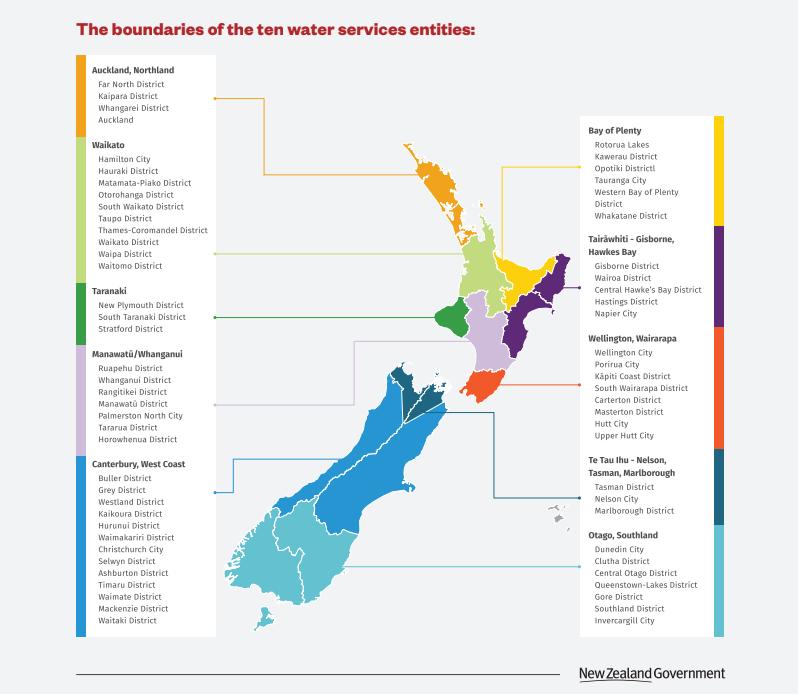
Three Waters Questions & Answers
What does it mean for me?
If your water services, like tap water, wastewater and stormwater drains are provided by your local council, these services will instead be provided by a Water Services Entity once they are established.
Instead of ratepayers paying for water services as part of their rates bill, in future they will pay one of the new entities for water services.
As of April 2023, Carterton was to be part on an entity with neighbouring councils in the Wellington region. This was discussed during Council’s May 2023 meeting.
The map below shows the boundaries of proposed entities.
Will there be changes to water pricing and billing? Will I pay more?
It is difficult to predict what a new entity would charge.
We still do not know the exact costs for each Council. What we do know is no matter which model is chosen, household costs for water are likely to go up due to the following changes taking place:
- Taumata Arawai Drinking water standards.
- The Water Services Bill currently going through Parliament.
- The proposed natural resources plan from GWRC.
- The national policy statement on freshwater management.
However, a report commisioned by government from the Water Industry Commission for Scotland says greater efficiencies created by entities covering a bigger population and range would drive lower operating costs, which may be passed on to users. [Water Industry Commission for Scotland – Economic analysis of water services aggregation, Final Report May 2021]
What is the timeframe for the reforms?
The timeframe has been refined by the new Water Services Entities (WSE) Amendment Bill, announced on Friday 16 June 2023 the Government introduced legislation that gives effect to changes to the water services reforms announced in April 2023.
The Bill includes changes to the WSE’s Act 2022, which changed some important dates for the reform. These include:
- a staggered approach to entity ‘go live’ dates, with all entities going live between 1 July 2024 and 1 July 2026.
- confirming the Northland and Auckland Water Services Entity will go live on 1 July 2024.
More information is available at DIA’s Water Services Reform Programme page.
How will the transition process be managed?
We are working closely with neighbouring councils and the National Transition Unit as we work towards the Water Service Entity taking on our water services.
You can find out more about the NTU on the Department of Internal Affairs web page.
How will Council involve Carterton's community in decision-making and feedback gathering during the the reforms?
Council’s channels for feedback are largely through:
- Existing relationships with central Government
- Submitting as an organsation through calls for public consultation to the Bills
- Compiling requests for information from agencies
Queries can be raised directly with DIA at waterservicesreform@dia.govt.nz.
What happened to the ‘better off’ money Council received?
CDC was allocated $1.7m of Tranche 1 Funding.
This means this amount of funding has been set aside for CDC and we can make project claims as the agreed projects progress, up until 30 June 2027.
Following a Government announcement in April 2023, Council were advised that the first tranche $500 million of Crown-funded ‘better off’ funding for local councils will proceed as scheduled. The second tranche of $1.5 billion better off funding has been discontinued. For CDC, the second tranche of better off funding equated to $5.1m (75%). The $500 million ‘no worse off’ funding package for councils remain in place ($1.7m for CDC) and will be managed by Crown Infrastructure Partners on behalf of the DIA.
Part of being allocated Tranche 1 Funding required Council to outline where it proposed to use those funds. These projects needed to demonstrate that they support local government to invest in the wellbeing of their communities in a manner that meets the priorities of both the central and local government.
Below is how we proposed to allocate all of the Tranche 1 funding:
- Five Towns Trail and Local Cycle Trail Masterplan: $270,000
- Climate management and mitigation for existing projects: $300,000
- Eastern Growth Area: $870,000
- Land-Based Discharge of Treated Wastewater and Nursery Investigation $100,000
- Māori Responsiveness Strategy and Action Plan : $160,000
We have received the first 10% of Tranche 1 funding ($170,000) which has been spread evenly across the above 5 projects.
Some of this may be re-allocated at a later stage and will still fall within the scope of the funding agreement with DIA.
Where can I find out more?
You can visit the Department of Internal Affairs Three Waters webpage.
Taumata Arowai became a new Crown entity in March 2021. Water NZ has put together water supply performance information of various Councils. This can be found here WaterNZ dashboard.
Local Government New Zealand (LGNZ) has compiled a FAQ about the Three Waters Reform.
News & Updates
Local Water Done Well
Development of a joint delivery arrangement for inclusion in a Water Services Delivery Plan The...
September/October 2023 – Water Services Reform Update
Establishment Chief Executives The Water Services Entities Amendment Act 2023 allows for the...
Three Waters Reform Update: July 2023
Ten Water Service Entities The programme will involve the establishment of ten Water Services...
December 2021 Update: Consultation, Working Groups, Exposure Draft Bill
Consultation: Economic regulation and consumer protection for Three Waters A consultation on the...
Three Waters Update: December 2021
Consultation: Economic regulation and consumer protection for Three Waters A consultation on the...
Government makes Three Waters Reform announcement
27 October 2021 Today the Government confirmed it will create publicly owned water entities as...
Carterton District Council responds to Three Waters Reform proposal
24 September 2021 Carterton District Council is preparing to submit its response to the...

